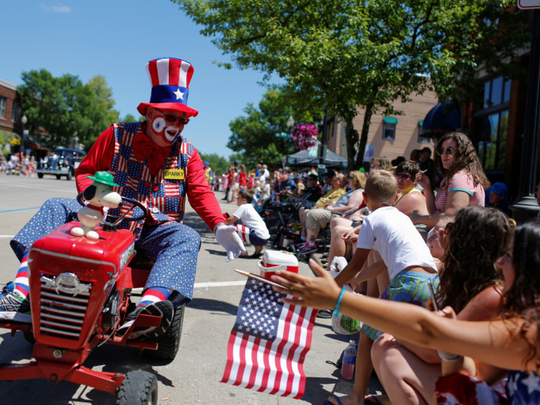
‘What’re you doing on the Fourth?” a friend asked. After all, it’s a given that Americans “do something” on the 4th of July each year in order to celebrate their nation’s birthday.
Beyond the backyard barbecues, the bursts of fireworks and the mandatory libations, some Americans even use the occasion to reflect on what exactly it is they are celebrating. And last Tuesday, American citizens, of every hue and party, every ethnicity and class, did just that. They came together — even in these divisive times — to celebrate the independence they have shared for the last 241 years.
But of course it was not always like that.
Consider this. On July 5, 1852, Frederick Douglass, the African-American activist, reformer and author — an escaped slave from Maryland who went on to become a national leader of the abolitionist movement in Massachusetts and New York — delivered that iconic speech of his, ‘The Meaning of July 4th to the Negro’, before an all-white audience in Rochester, New York, a speech so resonant with the ethos of the times, indeed a speech that remains as vital a piece of American oratory today as it was when delivered 165 years ago. In short, the greatest anti-slavery speech ever, Douglass, it should be noted, had refused the invitation of the sponsors to speak on the 4th of July, insisting they do so the following day. “This 4th of July is yours, not mine”, he averred. “You may rejoice, I mourn.”
He began his speech by asking: “What, to the American slave, is the 4th of July? I answer, a day that reveals to him, more than other days of the year, the great injustice and cruelty to which he is the constant victim. To him, your celebration is a sham; your boasted liberty, an unholy licence; your national greatness, swelling vanity; your shout of liberty and equality, hollow mockery.”
Then he went on to give a poignant and gut-wrenching account — at least that’s the way it sounds when you listen to it today as rendered by James Earl Jones, the distinguished African-American actor who is said to possess “one of the best-known voices in show business, a stirring basso profundo that has lent gravel and gravitas” to his many recitals — of a forced slave march to the New Orleans Slave Auction. And Douglass ended his speech by calling on all Americans to make the ideals of social justice and freedom celebrated on the 4th of July as a reality for all Americans.
A lot of water, you will agree, has gone under the bridge, and a lot of change has taken place in America since then: Slavery is behind it, Martin Luther King’s “dream”, articulated before 200,000 demonstrators gathered on the Mall in 1963 (“I have a dream that my three little children will one day live in a nation where they will not be judged by the colour of their skin, but by the content of their character”) has for the most part been realised, and the 1964 Civil Rights Act (civil rights and labour legislation that outlaw discrimination based on race, religion, gender and ethnicity) is a fact of life.
And that’s important. Very important, I say, because America’s moral posture, America’s foreign policy, America’s chosen priorities, never fail to affect the destiny of countless peoples around the world, and to affect, in equal measure, the very tenor of the global dialogue of cultures. All well and good to learn that, for example, Luxembourg and Monaco believe that all men and women are created equal, entitled to live their lives as free men and women, but as we say — with all due respect to Luxembourgers and Monegasques — when these two little countries sneeze, the world does not catch a cold, as it does when America sneezes.
And, Oh, yes, what did I do on the Fourth? I did what tens of thousands of my fellow Washingtonians did that day — I went to the Mall and stood there, in the shadow of the Capitol, to watch the fireworks as they went off, spectacular burst after spectacular burst, to celebrate America’s Independence Day.
The Washington Post’s news story on the event, co-written by three reporters, was titled ‘Oneness Rules the Fourth’. Yes, I did feel that oneness with my fellow-Americans, but as a Palestinian-American, I did not feel any oneness with my government, a government that has all these decades evinced hypocrisy — yes, I think that’s the honest word — as it played the role, albeit indirectly, of being an enabler of Israel’s subjugation of Palestinians in Palestine, thereby subverting the very soul of the Declaration of Independence, adopted by Congress on July 4, 1776, sanctifying the rights of people everywhere to “life, liberty and the pursuit of happiness” the “unalienable rights given to all human beings by their Creator”. And I’m convinced, as I’m sure you are, that He included in His bounty the Palestinian people as well. Tell that to all those folks who have occupied the White House since 1948.
Fawaz Turki is a journalist, lecturer and author based in Washington. He is the author of The Disinherited: Journal of a Palestinian Exile.









